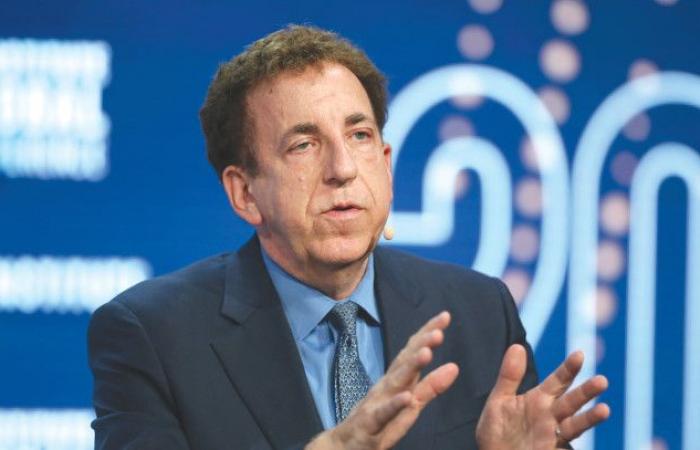Nowadays it is difficult to appear on the front page of any newspaper. Here in Israel there is a war in the south and another in the north of the country. In Europe, the conflict between Ukraine and Russia continues. There is a lot of movement in the political sphere in Israel and the presidential elections in the United States are approaching. It’s easy to see why it’s hard to get space in newspapers or on online sites.
But a little over a month ago, there was news in the medical world that was so important that it should have been on the front page. One wonders why it wasn’t like that!
Any of you who have read my columns before will have seen the name Dr. Dean Ornish on more than one occasion. Dr. Ornish is not afraid to go against the status quo. He has dedicated his long and illustrious career in cardiology and general medicine to researching how to prevent and reverse chronic diseases through lifestyle.
He was the first to demonstrate in a randomized controlled study in 1990 that you can actually reverse heart disease with a whole-food, plant-based diet along with other lifestyle interventions such as exercise and stress management. That was a great achievement and should have been instrumental in curing heart disease.
Unfortunately, conventional medicine did not accept and continues with medications, procedures and surgeries that sometimes save lives, but have nothing to do with treating the cause of the disease. Subsequently, Ornish has shown that early-stage prostate cancer can be reversed and that we can even reverse aging at the cellular level by reversing the deterioration of telomeres in the DNA strand.
The results of the Ornish trial
Now, Ornish and his colleagues have finally completed their trial to reverse early-stage Alzheimer’s disease. And the results are amazing.
Alzheimer’s has become prominent in society. There are nearly seven million people in the United States and 55 million people worldwide with Alzheimer’s, and these numbers are steadily increasing. It is the most terrible and feared disease. When you lose your memories, you really lose everything. Billions of dollars have been spent trying to find a drug that works.
In 20 years, two drugs have been approved and many feel Aducanumab should never have been approved. Its effects are negligible and the newer drug, Secukinumab, at best slows the rate of deterioration. These medications cost about $26,000 per year for the patient and side effects include bleeding and brain swelling.
We all want a cure, but much more emphasis needs to be placed on prevention. We know that a proper diet, adequate sleep, and keeping alcohol low in the diet or eliminating it completely will prevent 90% of the onset of this disease.
As the 20-year Chicago Health and Aging Project (CHAP) demonstrated, saturated fats are particularly bad. Multiple studies have shown that a high consumption of fruits and vegetables is especially good, especially leafy green vegetables. A 2018 study at Rush University showed that eating a lot of vegetables was equivalent to being 11 years younger. People whose diets are rich in meat, chicken and fish are twice as likely to get the disease.
According to Dr. Dean and Ayesha Sherzai, neurologists who direct the Alzheimer’s research project at Loma Linda University, 90% of cases of this terrible disease can be prevented. But now we know that we can even reverse the disease, and it’s not with a medication, but with intensive lifestyle intervention.
In Ornish’s study, not all patients showed improvement, but most did. In the control group, those who did not use the lifestyle intervention and instead underwent standard care showed a decrease. In some people who received the intervention, cognition improved and fibrous aggregates of amyloid protein receded.
Subjects walked 30 minutes every day and performed online strength training sessions. They were taught meditation and yoga. Patients were asked to get a good night’s sleep.
They were also given certain supplements. They followed a strict and healthy vegan diet. Total calories were not restricted, but protein and fat were limited to 18% of the total diet. No added sugars, alcohol or ultra-processed foods were allowed.
In an interview with CNN, two participants on the show talked about how much better things are going for them. Mike Carver said that he now thinks more clearly and that his physical health has also improved. Tammy Maida now sleeps better and is back to doing all her usual tasks, like doing laundry, cooking, reading, and keeping track of her finances. “The cloud of Alzheimer’s slowly began to lift,” she said. “Honestly, I’m more me than I had been in the years before starting Dr. Ornish’s program. “
This study was limited both in time and in the number of participants. It could be that a longer, more comprehensive test will show even better results. At the very least, it appears we can substantially slow this disease; At most, we can stop it in its tracks and even reverse it to some extent.
But what bothers me is that when the Alzheimer’s drug comes out that doesn’t actually do anything to reverse or stop the disease, it’s all over the newspapers, websites, television, and radio. However, here we have something that seems to work better than medications, but it is only mentioned here and there. It seems to me that it should have had a lot more air time.
Lifestyle medicine is amazing. It prevents and has reversed many chronic and even autoimmune diseases. There is no doubt that to reverse it, whether it is related to heart disease or Alzheimer’s, you need to strictly adhere to the lifestyle change, but isn’t it worth it? One of the people who left Ornish’s study simply couldn’t do it. She needed to stop at McDonald’s on the way home from her daily walks…every day!
That has me scratching my head. Pharmaceuticals and surgeries have their place. But when they have been proven ineffective and the lifestyle has been proven effective, what’s stopping us? Imagine a world where heart disease, diabetes, many cancers, and dementia are rare phenomena. I don’t see it as a chimera. I see it as a very achievable goal. But we must change conventional medicine’s prejudices against lifestyle intervention. When we can do that, we will all “add hours to our day, days to our year, and years to our lives.”
The author is a health and wellness coach and personal trainer with more than 25 years of professional experience. He is the director of The Wellness Clinic and can be reached at [email protected].






